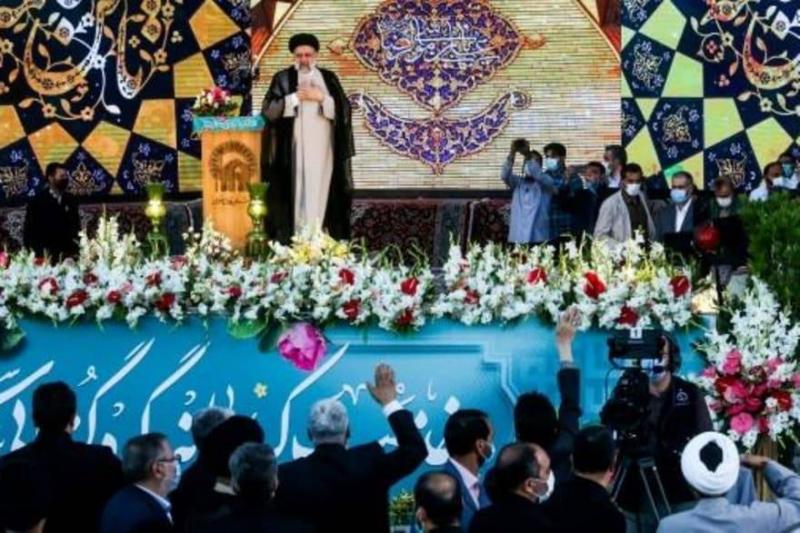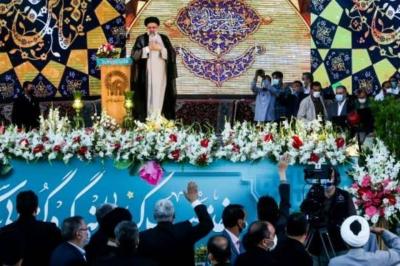The hardline governor Ebrahim Raisi will officially assume the presidency in Iran this week, succeeding moderate Hassan Rouhani, starting a four-year term marked from the outset by challenges in addressing the economic crisis, U.S. sanctions, and negotiations over the nuclear deal. Raisi, who won the June elections, will be formally inaugurated on Tuesday during a ceremony where the Supreme Leader of the Islamic Republic, Ayatollah Ali Khamenei, will endorse his "presidential mandate."
On Thursday, Raisi (60 years old) will take the oath of office before the parliament, which is dominated by conservatives, followed by the presentation of his ministerial candidates to gain parliamentary approval. The former head of the judiciary received approximately 62% of the votes in the first round of the election, which was characterized by the absence of any serious challengers and a participation rate of 48.8%, the lowest for a presidential election since the Islamic Republic's establishment in 1979.
This inauguration will conclude Rouhani's tenure, which consisted of two consecutive terms (starting in 2013) and was characterized by a relative opening towards the West, most notably marked by the signing of the 2015 Vienna Agreement on Iran's nuclear program with six major powers (the United States, Britain, France, China, Russia, and Germany). The agreement lifted sanctions on Iran in exchange for limiting its nuclear activities and ensuring the peaceful nature of its program. However, its effects have become nearly nullified since former President Donald Trump unilaterally withdrew from the agreement in 2018 and reimposed sanctions on Tehran, which negatively impacted its economy.
Addressing the economic and social crisis primarily caused by the sanctions—which were exacerbated by the COVID-19 pandemic—will be Raisi's top priority. He campaigned in 2021, as he did in 2017 when he lost to Rouhani, under slogans defending marginalized classes and combating corruption.
Klemen Term, a researcher at the European University Institute in Italy, tells AFP that Raisi's "fundamental goal will be to improve the economic situation by enhancing economic relations between the Islamic Republic of Iran and neighboring countries," through "establishing an economic system that protects Iran's economic growth from U.S. political options."
The researcher specializing in Iranian affairs adds that with this approach, "lifting the U.S. sanctions becomes a priority objective, but in order to achieve qualitative improvement and growth in trade exchanges between Iran and non-Western countries on the international scene," such as Russia, China, and neighboring states.
Iran has witnessed protests in recent years, particularly in the winter of 2017-2018 and November 2019, driven by economic concerns, with authorities responding with severity. Additionally, the Khuzestan province (southwest) experienced protests in July due to water shortages, coinciding with electricity outages in Tehran and major cities, which the authorities attributed to increased demand and a lack of water resources for power generation.
Hardline conservatives, who generally view the West with suspicion, especially the United States, have often criticized Rouhani for over-relying on results from the nuclear deal and have repeatedly called for focusing on local efforts to mitigate the sanctions' effects. Reformist economist Saeed Leylaz, close to the outgoing president, notes that "Rouhani was overly idealistic regarding his relationship with the West. He believed he would be able to quickly solve all of the country's problems through it." He adds to AFP, "It does not appear that this is the same with Mr. Raisi."
Raisi has stated after his election that his foreign policy priority is relations with neighboring countries. He will begin his term while Iran is engaged in talks with major powers, with indirect U.S. participation, to revive the nuclear deal by reaching an agreement that lifts U.S. sanctions and brings Washington back to it, in exchange for Iran returning to its nuclear commitments that it gradually diminished after the U.S. withdrawal.
President Joe Biden, who took office in early 2021 following Trump, has expressed readiness to return to the agreement. Six rounds of negotiations took place in Vienna from April to June, with no new dates established. Iranian officials have asserted that negotiations will not resume before Raisi takes office.
Term notes the reasons for delaying the resumption of negotiations from the Iranian perspective include "showing the U.S. side that Tehran is not in a hurry to reach a swift settlement." Further reasons include "internal politics and the new conservative government's desire to prove its ability to achieve a better agreement than the previous administration."
In his last meeting with officials on Wednesday, Khamenei stated that the experience of Rouhani's government proved that "trusting the West is of no benefit," according to a statement published on his website. The Supreme Leader, who has the final word on the country's high policies, pointed out that Washington conditioned its return to the agreement on subsequent negotiations related to Iran's missile program and regional issues, which Tehran had previously refused to include in nuclear discussions.
Raisi, known to be close to Khamenei, has affirmed that he will support talks that achieve "results" for the people but will not allow negotiations "just for the sake of negotiating." Leylaz argues that the "fate of the nuclear agreement" is one of the factors influencing the resolution of the economic crisis, believing that the current "uncertainty" regarding this file is "harmful and will be more harmful if Iran declares that it will not negotiate, thereby sanctions remain."
However, he predicts that it is unlikely to reach that extent "because Iran and the United States cannot maintain the status quo, and both parties need to reach a settlement."




